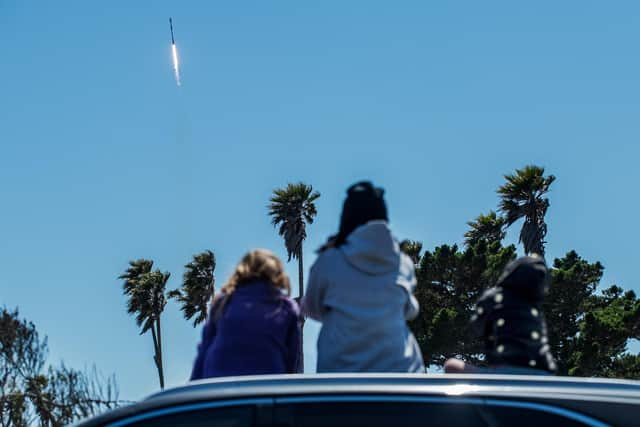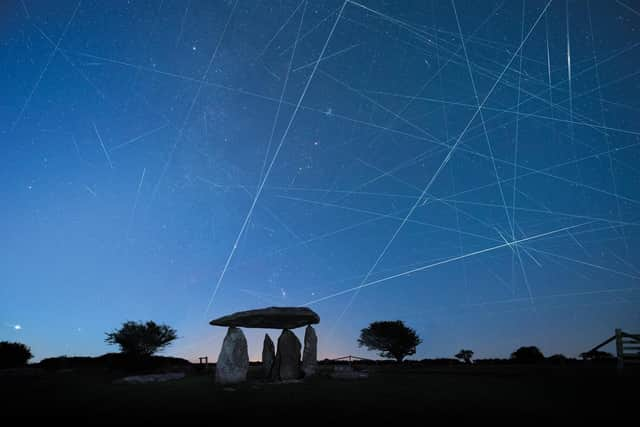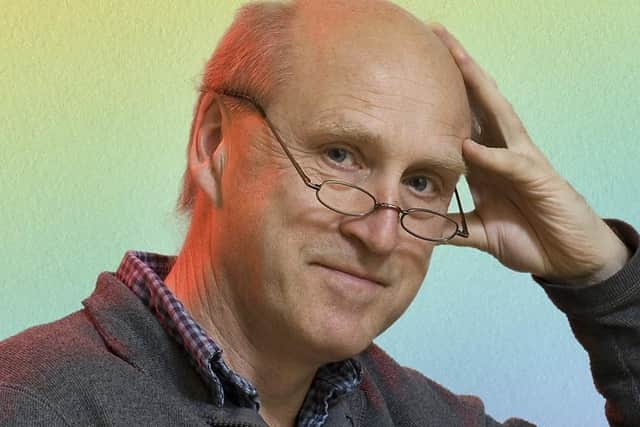Space race: Why we need to be custodians of the cosmos as Scotland takes giant leap
When I was a tiny boy there were three things I was entranced by – the universe, spaceships and computers. In my adult working life they linked up beautifully, as I used computers to analyse the images taken with cameras on spacecraft.
Then in late 2019, like many astronomers, I was shocked to see streaks passing across our images. It was like the stars were imprisoned behind bars. What was going on?
Advertisement
Hide AdAdvertisement
Hide AdThe streaks were caused by Elon Musk’s Starlink satellites – an exciting project aimed at giving internet connection to people in rural locations. Suddenly those three elements of my boyhood dreams – galaxies, spacecraft, and computers – were in conflict. It was like a loss of innocence.
Amateur astronomers and radio astronomers were worried too. For a radio antenna, looking for incredibly faint signals, a satellite just about anywhere overhead is like someone shouting in your ear.
Indigenous communities around the world are seeing pollution of the pristine sky, with its deep connection to cultural stories and traditions. Who asked their permission to walk across their sky?
In 2023 there was a Starlink rocket launch every two days. But it’s not just SpaceX. Other companies and nations are rushing to compete. The number of satellites is doubling every two years, with no sign of stopping.


It’s a mad gold rush. Or maybe more like the 19th-century ‘scramble for Africa’.
It’s not just astronomers getting worried. Other satellite companies are concerned about overcrowding and signals interfering with each other.
Scientists, policy-makers and industrialists see a looming problem of space junk – inevitably, over time, broken-off bits, old shattered spacecraft and left-behind rocket boosters gradually accumulate. We think there are hundreds of thousands of small pieces, only about 25,000 of which we can track, and all of which are shooting around space at 10km per second.


The smallest bits can punch a hole in your solar panel, and even a middle-sized piece can turn a live spacecraft into a dead one before you’ve even spotted it.
Advertisement
Hide AdAdvertisement
Hide AdMeanwhile, we all rely on activity in space – for monitoring the Arctic ice, driving with our Satnav, spying on our rivals and, yes, providing some of our internet connections. We could be shooting ourselves in the foot.
It’s not as bad as climate change or loss of biodiversity, but the issues are worryingly similar. How do we encourage economic activity while avoiding the damage from uncontrolled growth and aggressive competition?


Many of my colleagues are working with SpaceX and others on how to make satellites slightly darker. Some companies are trying to make a business out of junk collection. But my instinct is that we should be asking how many is enough.
Scotland is right at the crossroads of these issues. We have a world-leading astronomical track record; we are leading builders of small satellites and are starting to develop launch systems; and we are building new spaceports.
But at the same time there is an awareness of the issue of space sustainability – our space community has published a Space Sustainability Roadmap.
Get the inside track on what’s happening in the world of Scottish politics with our daily newsletter
As I write, a photographic exhibition called Our Fragile Space is showing at the foot of the Mound as part of the Edinburgh Science Festival, and the photographer Max Alexander and myself will be discussing these issues in-depth at the Royal Society of Edinburgh’s free public event, Custodians of the cosmos, on 3 April.
To be honest, I dislike the term ‘space sustainability’. What is being sustained here?
Like the pioneering US campaigner Moriba Jah, I prefer to speak of ‘space environmentalism’. We should strive to be responsible custodians of the cosmos.
Professor Andy Lawrence is regius professor of astronomy at the University of Edinburgh, author of Losing the Sky and a fellow of the Royal Society of Edinburgh
Comments
Want to join the conversation? Please or to comment on this article.